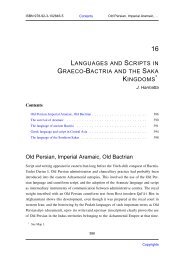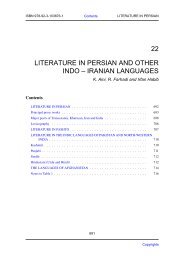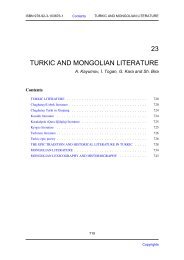1 Expanded version April 2013 - Unesco
1 Expanded version April 2013 - Unesco
1 Expanded version April 2013 - Unesco
Create successful ePaper yourself
Turn your PDF publications into a flip-book with our unique Google optimized e-Paper software.
Volunteerism has historically been viewed in some contexts as providing a service or making<br />
a contribution to a non-profit organisation of choice, without any expectation of remuneration.<br />
This model however is not all true in low income environments where it is not always feasible<br />
for volunteers to operate without stipends or allowances. While most volunteers do not initially<br />
expect to receive remuneration for services offered and initially regard their contributions as a<br />
way to develop their own communities and/or to gain work experience, studies on the<br />
feasibility of local correspondents had shown that this is hardly sustainable. Alternatives<br />
pointed out from the surveys and trainings include the elaboration of a flexible set of incentive<br />
schemes for correspondents according to the radio station’s means. These can cover a mix of<br />
cash payments, airtime, mobile phones, recorders, availability of location for editorial work<br />
and other benefits as appropriate and affordable. These arrangements need to be defined in a<br />
clear policy taking into consideration the number of hours worked and skills level, and stations<br />
need support in this process.<br />
The need for training and educational material in local languages was highlighted in some of<br />
the workshops. In Mafeteng Community Radio, it was suggested to have resources in<br />
Sesotho, while in Tanzania most of the correspondents and local radio practitioners are more<br />
conversant in Kiswahili than in English. This caused difficulties, especially when Englishspeaking<br />
experts were involved in the training due to lack of Kiswahili-speaking trainers. The<br />
language problems have established the need to always provide a local trainer who can<br />
translate the training into Kiswahili. Taking this need into account, the Youth Radio Toolkit,<br />
which is still under production, will also be published in Kiswahili.<br />
26






